Word Search Dynamically allocated memory in C A common game
Word Search Dynamically allocated memory in C !!
A common game in newspapers is a word search. You are given a grid of letters and must find
words that appear in the grid. If you can choose the starting letter of the word within the grid,
and then go in one of the 8 possible directions (up, diagonal up and right, right, diagonal down
and right, down, diagonal down and left, left, diagonal up and left) and spell out the word exactly
as you go by each letter, then the word is in the grid. Here is an example of a partially solved
word search:
In a typical word search, you are given a list of words, each of which can be found in the grid. In
this example, we can see that the word \"TWIZZLERS\" appears starting in the last row and first
column, going along the up and left diagonal. We can find \"PAYDAY\" starting on the 5th row
and 6th column, going left.
Obviously, solving a word search is very time consuming. You\'ve decided to use your
programming skills to very quickly solve word searches so that you can impress your friends
with your \"vision\"!
Programming Tip: DX and DY arrays
In many programming applications, one must start in some location on a two dimensional grid
and then they must move in one of several directions. In terms of coding, it would be nice if one
could simply \"loop\" through each of the possible directions in a seamless manner. The best way
to do this is to define constants that store each of the possible directions of movement. For this
program, these constants look like the following:
const int DX_SIZE = 8;
const int DX[] = {-1,-1,-1,0,0,1,1,1};
const int DY[] = {-1,0,1,-1,1,-1,0,1};
These should be defined before main, where constants are typically defined.
Now, if we are currently at a spot (x,y), we can move to each of the adjacent locations as
follows:
for (i=0; i int nextX = x + DX[i];
int nextY = y + DY[i];
// (nextx, nexty) represents the adjacent location in
// direction i.
}
For this assignment adjustments will have to be made to this framework, but the overarching idea
is very, very useful as it avoids an if statement with 8 branches which is very, very error prone.
In this framework, the logic has to be written once and the DX and DY arrays have to be double
checked, that\'s it!
Dictionary Information and Binary Search
Before the program processes any word search grids, your program should load in the dictionary
from the file, dictionary.txt. The first line of this file will have a single positive integer, n,
representing the number of words in the dictionary. The words follow on the next n lines, one
word per line. Each word will only contain lowercase letters and be in between 4 and 19 letters
long, inclusive.
It is recommended that you use a binary search to see if a particular string is in the dictionary. If
you use a linear search, your program will not earn full credit.
The Problem
Given an input dictionary read in from a file to use for all test cases, and several word search
grids, identify all words from the dictionary that appear in each word search grid.
The Input (of word search grids, to be read in from standard input)
The first line of the input file will contain a single positive integer, c (c 100), representing the
number of input cases. The input cases follow, one per line. The first line of each input case will
contain two positive integers, r (4 r 300), and c (4 c 300), representing the number of
rows and columns, respectively, in the word search grid. The following r lines will contain
strings of exactly c characters, all of which will be lowercase letters for each row of the word
search grid for that input case.
The Output
For each case, output a header with the following format:
Words Found Grid #k:
where k is the grid number starting with 1. (Please pay attention to the capitalization above,
the pound sign and the colon. You will lose a small amount of credit if you don\'t use this
exact format.)
Output all the words from the dictionary found in the grid on the following lines, one per line.
You may output these in any order and you may output the same word more than once, but you
should not output any string that isn\'t in the dictionary, or output any valid word that does
not appear anywhere in the grid. I will assign a small amount of extra credit if you can only
output each valid word once and another little bit of extra credit if you output these words in
alphabetical order. You can only get the extra credit if your solution is 100% correct.
Sample Input Sample Output (using posted dicationary.txt)
2 Words Found Grid #1:
4 4 trap
syrt part
gtrp cats
faaq Words Found Grid #2:
pmrc swing
5 6 wing
swingh letter
abcdef
rettel
ayzgfd
cmtydh
Specification Details
You must use dynamic memory allocation to store the input dictionary and each individual word
search grid. You must free your memory appropriately. You must read the input dictionary from
the file dictionary.txt, which will be posted online.
Note that the dictionary will be read in from a file.
Solution
#include <stdlib.h>
#include <stdio.h>
#include <string.h>
const int DX_SIZE = 8;
const int DX[] = {-1,-1,-1,0,0,1,1,1};
const int DY[] = {-1,0,1,-1,1,-1,0,1};
void checkWord(int numWords, char** dictionary, char* word);
int main(int argc, const char * argv[]) {
int i, numWords;
char** dictionary;
FILE* file = fopen(\"dictionary.txt\", \"r+\");
fscanf(file, \"%d\", &numWords);
dictionary = (char **)calloc(numWords, sizeof(char*));
char temp[20];
//Scan in dictionary
for (i = 0; i < numWords; i++) {
fscanf(file, \"%s\", &temp[0]);
char* word = malloc(sizeof(temp)+1);
strcpy(word, temp);
dictionary[i] = word;
}
int j, k, numCase,p;
char** grid;
scanf(\"%d\", &numCase);
// Read in grids
for (i = 0; i < numCase; i++) {
printf(\"Words Found Grid #%d:\ \", i+1);
int r, c;
scanf(\"%d %d\", &r, &c);
grid = (char **)calloc(r, sizeof(char*));
for (j = 0; j < r; j++) {
char* row = malloc(c+1);
scanf(\"%s\", &row[0]);
grid[j] = row;
}
// Check for words in this puzzle
for (j = 0; j < r; j++) {
for (k = 0; k < c; k++) {
char* check = malloc(r*c*sizeof(char));
char* p;
int s;
for (s = 0; s < DX_SIZE; s++) {
p = check;
*p++ = grid[j][k];
*p = \'\\0\';
int checking = 1;
int nextX = j;
int nextY = k;
//Call binary search method for each possible word in grid
while (checking) {
checkWord(numWords, dictionary, check);
nextX += DX[s];
nextY += DY[s];
if (nextX < 0 || nextY < 0 || nextX >= r || nextY >= c) {
checking = 0;
break;
}
else {
*p++ = grid[nextX][nextY];
*p = \'\\0\';
}
}
}
}
}
//Free grid memory
for (p = 0; p < r; p++) {
free(grid[p]);
}
free(grid);
}
//Free dictionary memory
for (i = 0; i < numWords; i++) {
free(dictionary[i]);
}
free(dictionary);
return 0;
}
void checkWord (int numWords, char** dictionary, char* word) {
// Binary Search
int begin = 0;
int end = numWords;
while (begin < end) {
int middle = (begin + end) / 2;
int comp = strcmp(dictionary[middle], word);
if (comp < 0 ) {
begin = middle + 1;
}
else if (comp > 0) {
end = middle;
}
else {
printf(\"%s\ \", word);
break;
}
}
}
input.txt
2
4 4
syrt
gtrp
faaq
pmrc
5 6
swingh
abcdef
rettel
ayzgfd
cmtydh
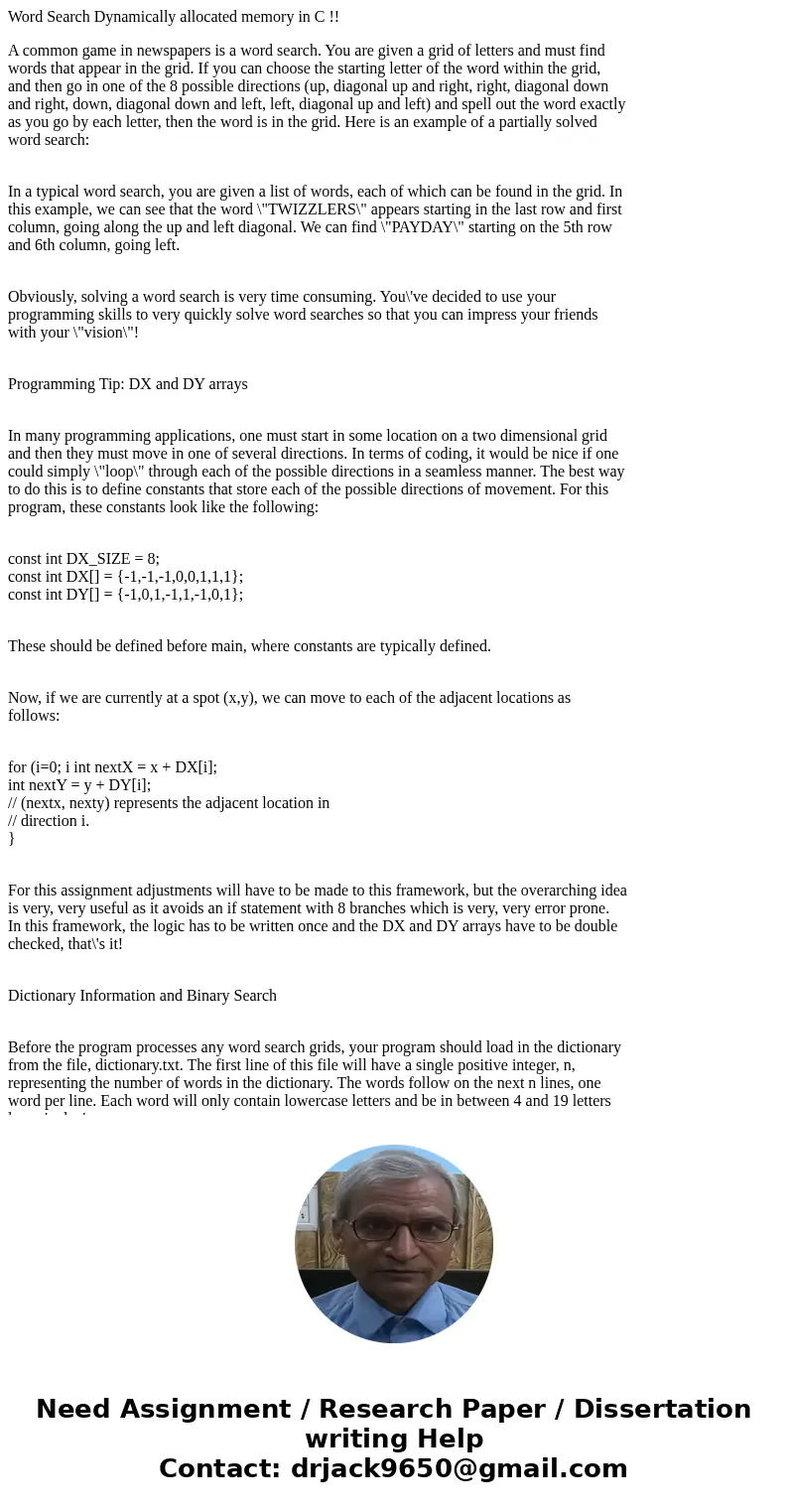
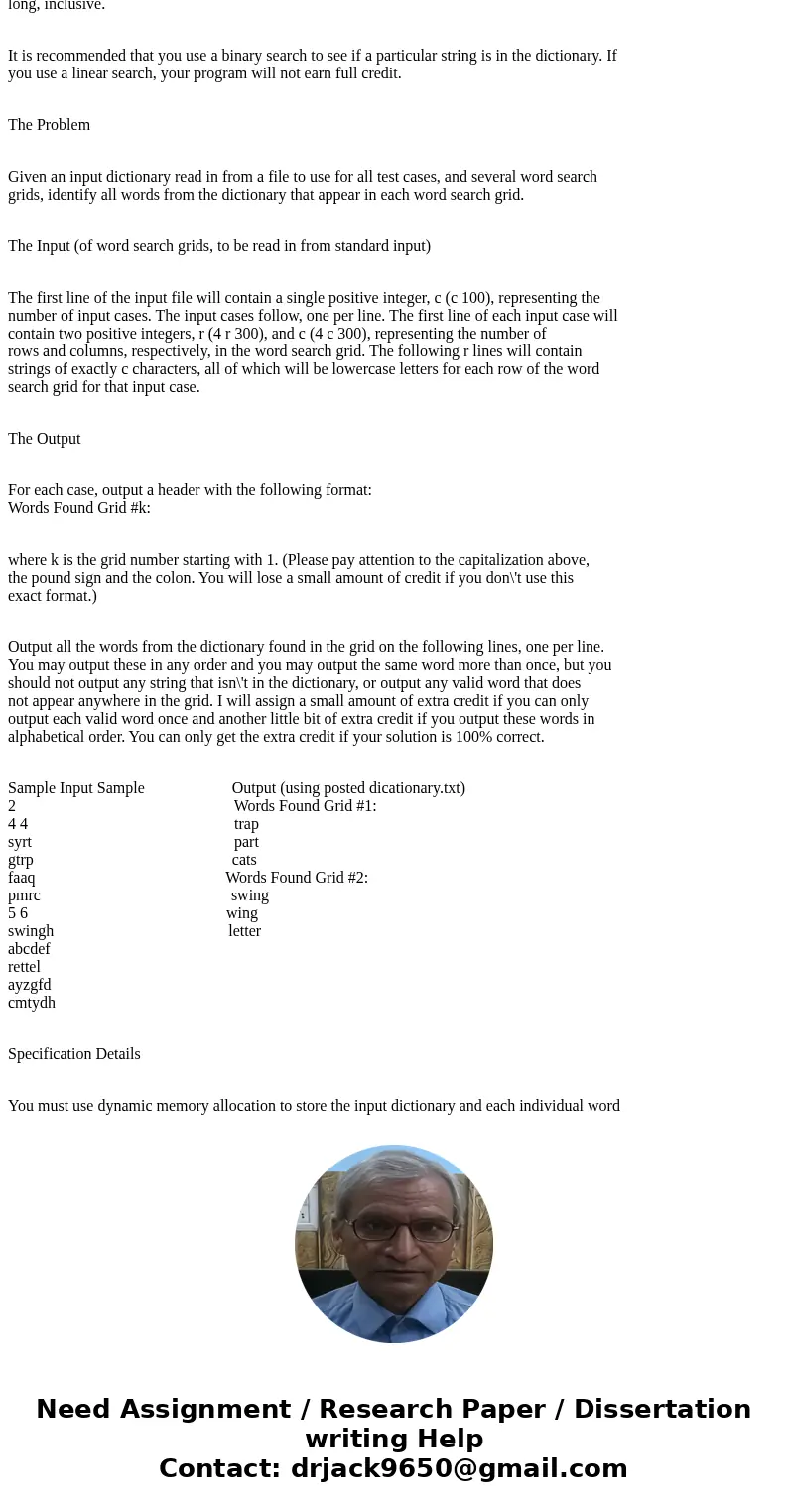
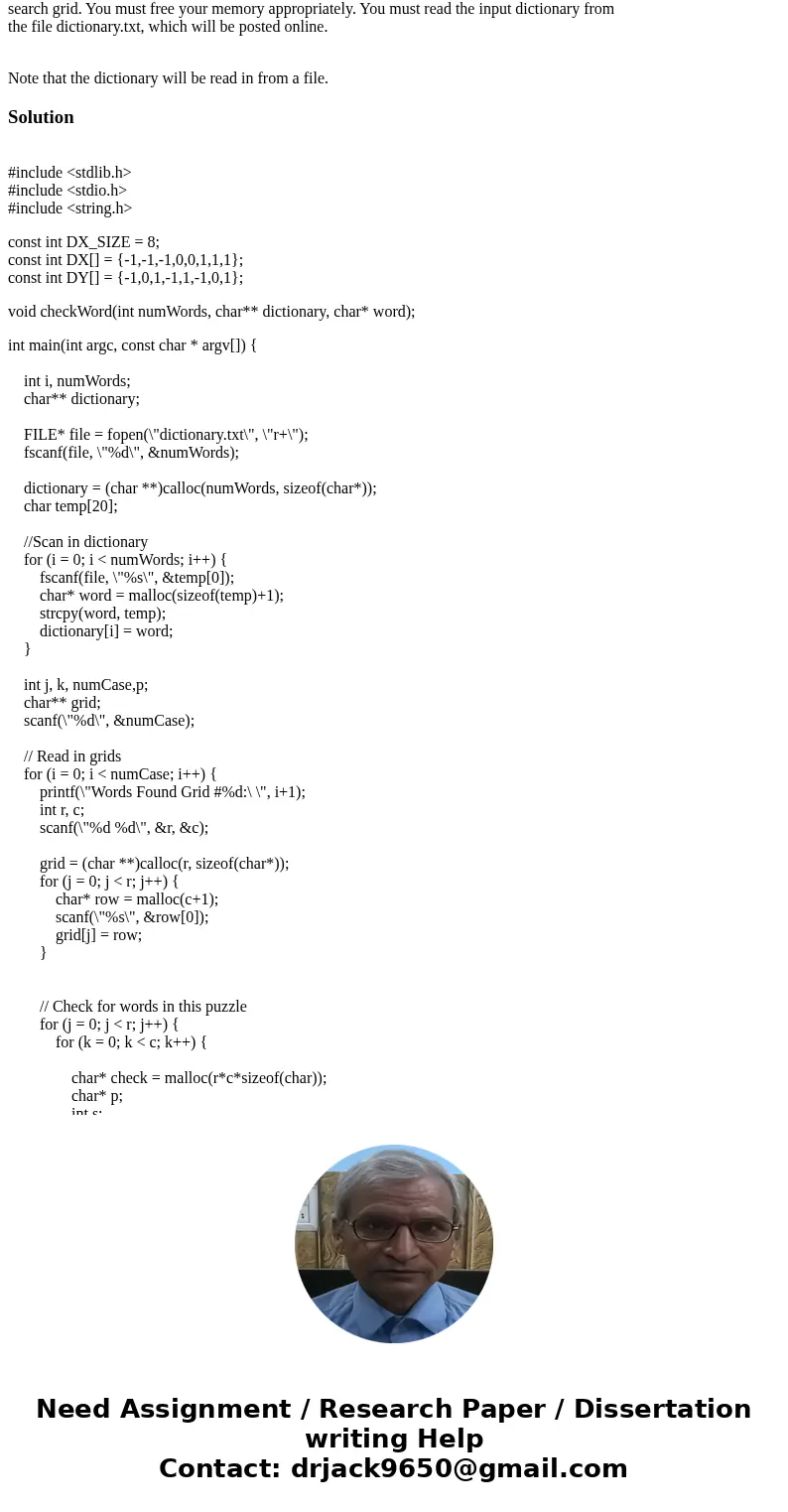
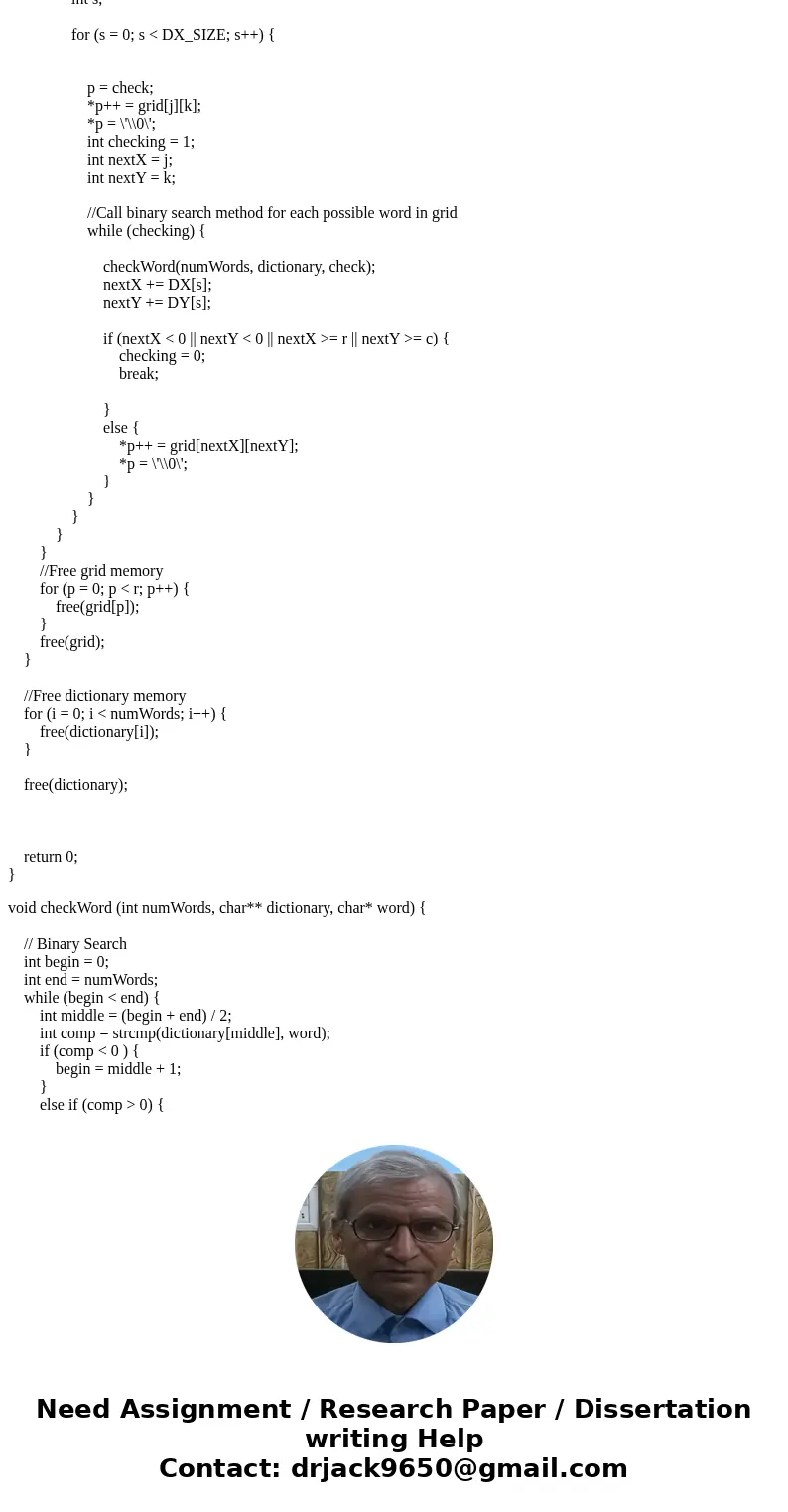
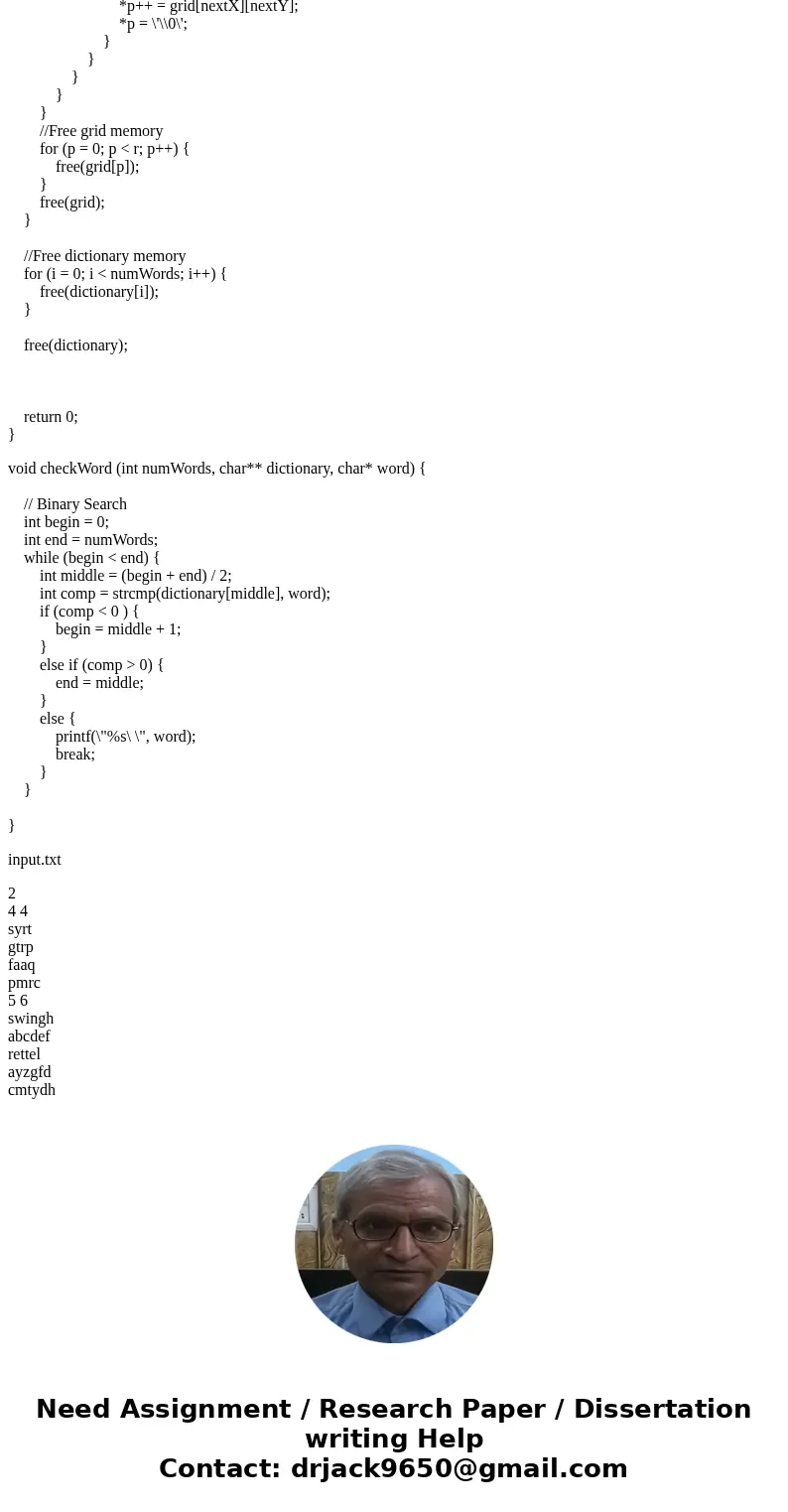
 Homework Sourse
Homework Sourse